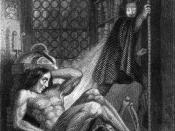The Important Things in LifeMany of us forget the saying ÃÂfamily comes first.ÃÂ With so many distractions and duties to complete we loose sight of the importance of family. In the novel Frankenstein, Mary Shelley, discloses her observations about family life and parent-child relationships. Even though Victor learns the essentials of being a responsible guardian through his loving parents and family, he neglects these learned responsibilities, ultimately losing what matters to him the most, his familyRight from the beginning of the novel, Victor is surrounded by a loving family, delineating the necessity of human relationship and the importance of being loved. For example, Victor ÃÂclaims to have two affectionateÃÂ parents who are ÃÂattached to each otherÃÂ (pg. 33). Frankenstein describes them as being loving parents who focuses their time on their child and in return learns all the skills of becoming a responsible parent. Also, the Frankenstein family takes in the orphaned Elizabeth Lavenza since Caroline Frankenstein believes it is ÃÂunfair to her to keep her in poverty and want when Providence afforded her such powerful protectionÃÂ (pg.
35). Shelley states that nothing could be more horrible than to be denied and to be without nurturing parents who will love her. Parents must take care of their children since it was their decision or their irresponsibly that brought them into this world. Plus, Caroline sacrifices herself in order to take care of Elizabeth. CarolineÃÂs choice to tend for Elizabeth, even though she looses her own life, emphasizes her selflessness. Specifically, Shelley suggests that when unable to take care of oneself, love for another drives a person to care for the injured.
On the other hand, people do not always follow in the same path as how they were raised and instead contradict what they have been taught. This is evident when Victor ÃÂdeparts for Ingolstadt, which had been deferred by these events [his motherÃÂs death],ÃÂ and does not talk to his family for over two years (pg. 43). Victor knows his father and Elizabeth wish to see him, but instead he concentrates solely on his work. His ability for altruism gets destroyed by his obsession and over time looses his family morals he once practiced. Ironically, once he does finish his work, Victor cannot ÃÂendure the aspect of the being [he] had created, [he] rushed out of the room and continued a long time traversing my bedroom chamber, unable to compose [his] mind to sleepÃÂ (pg. 56). Frankenstein, his own creator, purposely does not talk to his creation due to his grotesque appearance and denies him of family love and companionship. Unlike a normal human being, the Created One has no family and no acceptance. The Creature gets sent into the world as an adult, without a parent to teach him the behavior of the human world. Despite all of VictorÃÂs family experience he lacks the dependability of a good parent for his creation he once passionately wanted. If Frankenstein took the time to care for his creation then he would not have developed his animosity that guided him to murdering VictorÃÂs family. The monsterÃÂs rebellion stresses ShellyÃÂs high morals on parenting and its consequences when they are not followed.
With all the knowledge that he acquires on being a respectable parent, Victor Frankenstein suffers because he chooses to disregard his family morals. Immediately from VictorÃÂs first opening words, he speaks of his parents and his fortunate childhood. But distraction alters his motives which causes a change in his principles. Because of our stereotypical beliefs and VictorÃÂs poor parenting skills, the Creature gets brought up into a world where he is not accepted which eventually leads to VictorÃÂs destruction. Through VictorÃÂs family and his outcome Mary Shelley depicts the significance of family.
Source:Mary Shelly's Frankenstein



